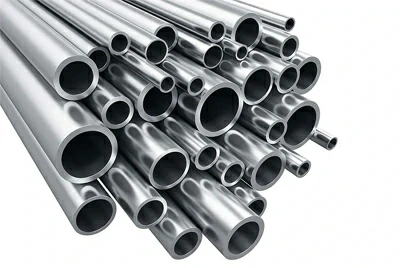Titanium Condenser Tubes
Updated : Oct. 22, 2025Titanium condenser tubes are the core component of condensers. Compared with traditional copper-nickel or brass tubes, titanium delivers superior corrosion resistance and long service life, with over 40 years of proven use in global power, petrochemical, and seawater desalination industries, achieving almost zero corrosion and zero leakage.
Chalco titanium, with advanced extrusion and cold rolling lines, supplies gr2, gr7, and gr12 condenser tubes in thin wall, seamless, welded, finned, and coiled forms. We focus not only on higher heat transfer efficiency and lower life cycle cost, but also on delivering safe and sustainable long-term solutions.
Why choose titanium condenser tubes?
- copper-nickel and brass often suffer from pitting and dezincification in seawater, while stainless steel is prone to stress corrosion in chloride environments, but titanium remains stable long term
- titanium forms a self-healing oxide film that quickly restores corrosion resistance even after scratches
- service life exceeds 40 years, 5–10 times longer than copper-nickel, brass, or stainless steel tubes
- lower life cycle cost: despite higher initial investment, downtime and maintenance expenses are greatly reduced
- titanium releases no heavy metals like copper or zinc, is 100% recyclable, and fully meets modern environmental and ESG requirements
Chalco titanium full range of condenser tube products
In power, petrochemical, desalination, and refrigeration industries, different conditions require different condenser tubes. Chalco titanium offers a full range of titanium condenser tube types compliant with ASTM B338, ASME SB338, ASTM B862, and ASTM B861, with customization available to ensure optimal performance across all applications.
-
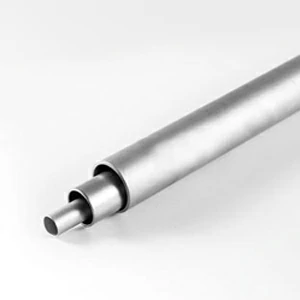
Seamless titanium condenser tubesProduced to ASTM B338 and ASME SB338 standards using extrusion and drawing processes, featuring no welds, high density, and excellent pressure resistance, widely applied in power plant surface condensers, petrochemical heat exchangers, and seawater desalination systems.
-

Welded titanium condenser tubesManufactured to ASTM B861 and B862 standards by forming and welding titanium strip followed by heat treatment, enabling mass production and longer lengths at lower cost than seamless tubes, suitable for power plants and large-scale refrigeration equipment.
-
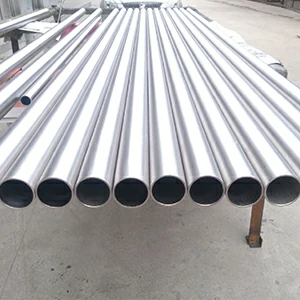
Straight titanium condenser tubesThe most common configuration with simple structure and easy installation and maintenance, widely used in power plant surface condensers, chemical heat exchangers, and seawater desalination units, serving as the basic choice for various systems.
-

U type titanium condenser tubesFabricated to U shape per drawings and annealed for stress relief, widely used in compact layouts such as power plant condensers and petrochemical heat exchangers, reducing the number of tube-to-tubesheet welds and enhancing system sealing and reliability.
-
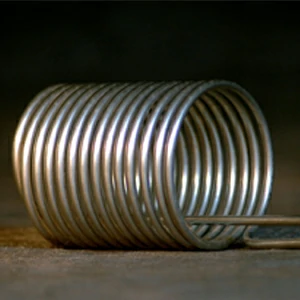
Coiled titanium condenser tubesFormed by bending titanium tubes into spiral or serpentine coils, featuring large heat transfer area and compact structure. With excellent corrosion resistance, they are widely used in seawater cooling, electroplating baths, and chemical condensing equipment.
-
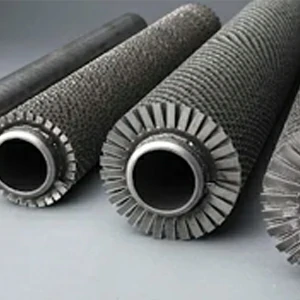
Finned titanium condenser tubesWith fins rolled or attached on the outer wall, significantly increasing heat transfer area, they perform exceptionally in high-efficiency refrigeration and chemical heat exchange equipment, especially where shell-side space is limited.
-

Titanium clad condenser tubesFeaturing a titanium outer layer and a steel or copper inner layer, combining titanium’s corrosion resistance with the strength or thermal conductivity of the base material, they provide a cost-effective custom solution for power plant condensers and petrochemical heat exchangers.
-
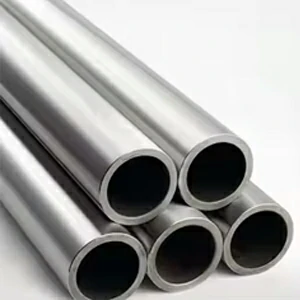
Titanium lined condenser tubesUsing carbon steel or stainless steel as the base tube with a titanium layer on the inner wall, they cost less than full titanium tubes and are suitable for heat exchange systems with limited budgets but high corrosion resistance requirements.
Chalco titanium condenser tube alloy selection
In different operating conditions, selecting the right titanium alloy is critical. Chalco titanium offers a wide range of condenser tube grades, from industrial pure titanium to alloyed titanium, covering power plants, seawater desalination, petrochemical, and high flow environments, ensuring optimal performance and long service life under all conditions.
-
Grade 2 condenser tubes
Commercially pure titanium, widely used, resistant to seawater and atmospheric corrosion, with over 40 years service life
-
Grade 7 condenser tubes
Titanium-palladium alloy with strong crevice corrosion resistance, ideal for stagnant or cyclic water conditions
-
Grade 12 condenser tubes
Titanium-molybdenum-nickel alloy with high erosion and pitting resistance, used in high flow or sand-containing water
Selection guide
Grade 2 is the most common commercially pure titanium. It provides stable corrosion resistance and cost efficiency, making it the preferred choice for most power plants and desalination projects.
Grade 7 is better suited for high chloride and stagnant water conditions. Its crevice corrosion resistance is significantly stronger than pure titanium, ensuring reliable long-term operation.
Grade 12 is designed for high flow, sandy, or erosive environments. Its alloying enhances resistance to erosion and pitting, greatly improving system reliability.
Available Sizes
Chalco titanium offers condenser tubes in multiple specifications to meet the demands of power, nuclear, petrochemical, and desalination applications:
- Outer diameter (OD): 3/8” (9.52 mm), 1/2” (12.7 mm), 5/8” (15.88 mm), 3/4” (19.05 mm), 1” (25.4 mm); up to 1.5” (38.1 mm) for special applications
- Wall thickness (WT): 0.3–1.5 mm; ultra-thin down to 0.076 mm for high heat transfer; typical power plant use 0.889–1.24 mm
- Length (L): up to 15,000 mm, custom cut available
- Structures: straight tubes, U-bent tubes, thin-wall tubes, inner-grooved tubes, integral finned tubes, double-wall leak detection tubes
Applications of titanium condenser tubes
With outstanding corrosion resistance, long service life, and high heat transfer efficiency, titanium condenser tubes have become the preferred material in many critical industries. Chalco titanium supplies products to global customers, widely used in the following fields:
Power industry
Used in surface condensers of thermal and nuclear power units, delivering over 40 years of service life in seawater or circulating water, greatly reducing shutdowns and retubing frequency.
Contact us now
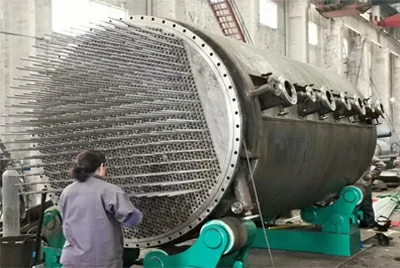
Petrochemical industry
Applied in gas-liquid separation, rectification, distillation, and cooling equipment, resisting corrosion from chlorides and complex media to ensure long-term stable operation.
Contact us nowDesalination and water treatment
Used as tubing for evaporators and condensers, titanium offers near-zero corrosion in high salinity environments, making it the ideal choice for multi-stage flash (MSF) and multi-effect distillation (MED) processes.
Contact us now
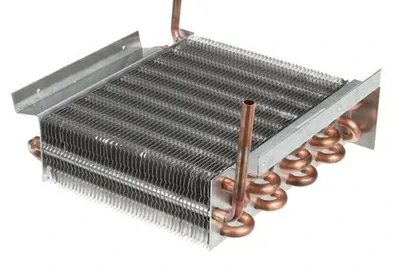
Refrigeration and HVAC
In industrial cooling systems and large HVAC condensers, titanium tubes provide higher cleanliness factors and lower maintenance costs.
Contact us nowLNG and chemical storage and transportation
Used in cryogenic heat exchange and regasification units, titanium resists seawater and condensate corrosion, ensuring long-term safe operation of energy facilities.
Contact us now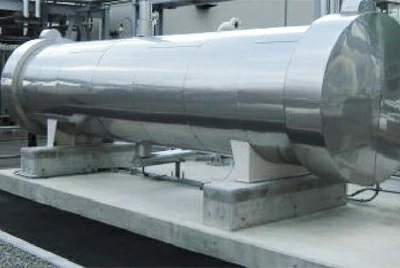

Nuclear power sector
In nuclear plant condensers, titanium tubes ensure safety and long life, with near-zero corrosion and a failure rate just 1/100 of copper alloys or stainless steel.
Contact us nowWhether in power, nuclear, petrochemical, or desalination, Chalco titanium condenser tubes deliver reliable performance even in the harshest environments.
Successful cases
-

Ringhals power plant, SwedenAdopted gr2 commercially pure titanium condenser tubes in the 1980s, operating safely for over 20 years without pitting or perforation, saving an estimated 3 million USD in downtime and maintenance costs.
-
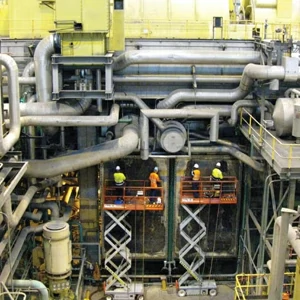
U.S. nuclear power plant retubing projectsIn the 1970s–80s, several nuclear stations replaced copper-nickel alloy tubes with ASTM B338 gr2 titanium tubes. Results showed over 40 years of service with zero corrosion and a failure rate just 1/100 of copper alloys, greatly improving plant reliability.
-
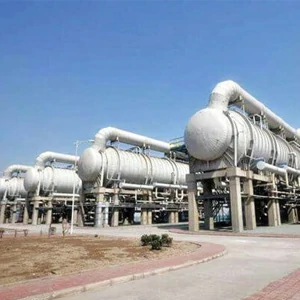
Middle East desalination plantIn multi-stage flash (MSF) desalination units, gr7 double-wall titanium condenser tubes combined with online sponge ball cleaning maintained 92% heat transfer efficiency over long-term operation, significantly extending service cycles and reducing maintenance frequency.
From European power plants to U.S. nuclear stations and Middle East desalination projects, titanium condenser tubes have proven long-term stability in the harshest environments. Chalco titanium transforms these successes into repeatable solutions, delivering reliable assurance to customers worldwide.
Quality control and manufacturing capabilities
- Annual capacity of 5,000 tons with two Φ25 / Φ38 mm continuous rolling lines, ensuring stable supply for large projects
- 100% eddy current, ultrasonic, and hydrostatic testing throughout the process, with complete baseline data provided for full traceability
- Certified to AS9100D, ISO 9001, and Nadcap, fully meeting standards of aerospace, energy, and nuclear industries
- Global delivery and service network for fast customer response, supporting long-term partnerships and urgent projects
We promise that every titanium condenser tube undergoes strict inspection and full traceability to ensure stable performance even in the harshest environments.
Titanium condenser tube buying guide
Before purchasing titanium condenser tubes, clarifying the following key information will help you obtain the most suitable solution and avoid risks during operation:
Cooling water type and quality parameters
Identify whether the source is seawater, freshwater, or circulating water, and provide key indicators (Cl⁻ content, suspended solids SS, pH value, frequency of stagnation). These data determine alloy selection: gr2 for general seawater, gr7 for stronger crevice corrosion resistance, and gr12 for high flow or complex conditions.
Target service life
Define design expectations, such as ≥25 years without retubing. Titanium offers far longer service life than copper-nickel and stainless steel, reducing total life cycle costs.
Design flow velocity range
Provide the equipment's design velocity. Titanium condenser tubes can operate stably at 12–30 m/s without erosion, allowing more flexibility for efficient heat transfer design.
Tube sheet material and connection method
Specify the tube sheet material (clad carbon steel, titanium, or stainless steel). We will recommend suitable joining processes (mechanical expansion, grooving, seal welding) and protection measures to ensure long-term joint reliability.
Inspection and cleaning requirements
Do you need NDT (eddy current/ultrasonic testing) and online cleaning solutions? We can provide complete inspection data, installation manuals, and recommendations for sponge ball or brush cleaning systems to help maintain heat transfer efficiency.
Related product recommendations
FAQ
Do you provide free samples?
We can supply short titanium tube samples according to customer needs for testing and trial installation, supporting early project validation.
What is the minimum order quantity?
The MOQ for standard titanium condenser tubes is 10 kg. Small trial orders are supported, and quantities can be flexibly adjusted based on project requirements.
Are there discounts for major or long-term customers?
For bulk orders and long-term partners, we offer exclusive pricing policies and customized service plans to ensure cost and delivery advantages.
Will titanium tubes develop algae? How to clean them?
Titanium tubes have smooth surfaces and release no heavy metal ions, making them resistant to stubborn biofilm. Regular online sponge ball or brush cleaning systems are sufficient to keep them clean, with no need for additional chemical cleaning.
Is 0.5 mm thin-wall tube strong enough?
As long as strength and vibration checks are met, 0.5 mm thin-wall titanium tubes can operate safely for the long term. Thin walls also reduce pump power requirements and improve heat transfer efficiency.
Will galvanic corrosion occur with carbon steel tubesheets?
With proper protection measures (such as titanium-clad tubesheets, inner grooving with mechanical expansion, and seal welding if necessary), galvanic corrosion is fully controllable. We can recommend the best solution based on operating conditions.
How to calculate payback if the initial investment is high?
Titanium tubes last 5–10 times longer than copper-nickel or stainless steel, with significantly lower maintenance and downtime costs. Most projects recover investment within 3–5 years and generate benefits for another 20–30 years.
Can titanium tubes be recycled?
Titanium is 100% recyclable and releases no heavy metals, fully meeting global environmental and ESG requirements. Even used titanium tubes retain high residual value, further reducing total life cycle cost.
Chalco titanium provides a full range of condenser tubes and engineering support to ensure long-term stable operation even in the harshest environments. Contact us anytime for the best solution tailored to your needs.
Chalco can provide you the most comprehensive inventory of titanium products and can also supply you customized products. Precise quotation will be provided within 24 hours.
Get a quote


